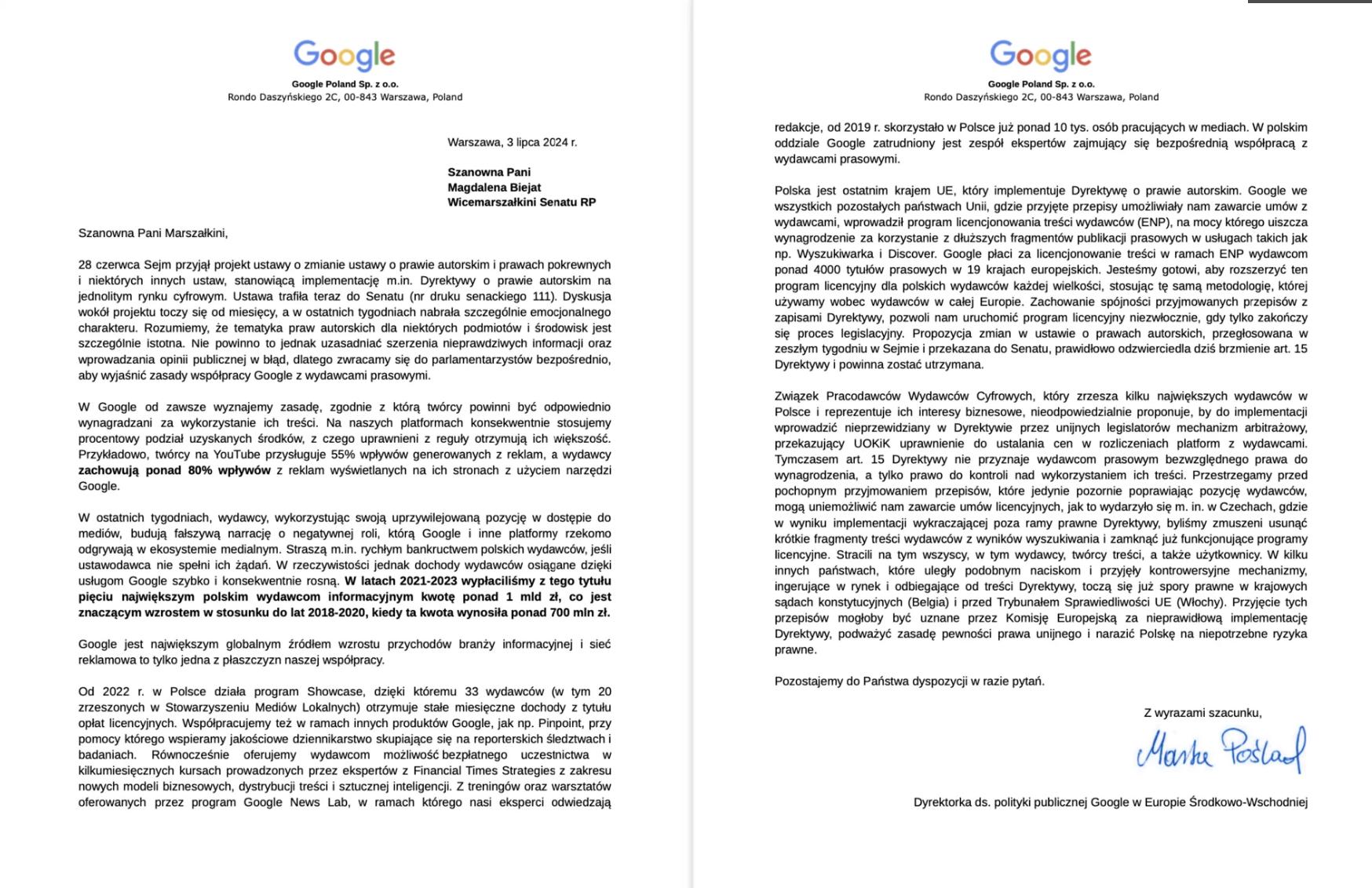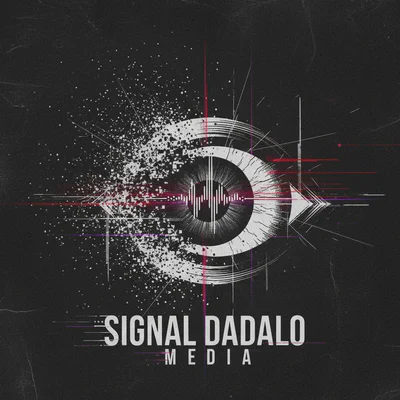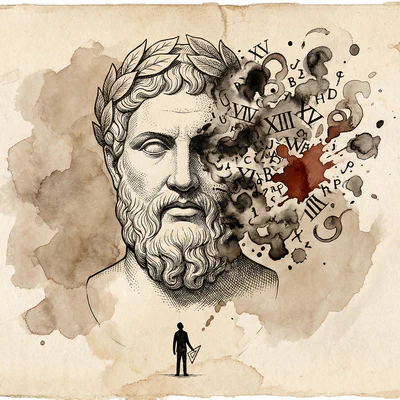An analysis of Google's response to creators' protests in the context of the EU Copyright Directive in the Digital Single Market and law amendments. Presentation of both sides' arguments and commentary on the hypocrisy of big tech and publishers.
Table of Contents
The dominance of Google, Apple, Netflix, Amazon, and Facebook contributes to the rise of conspiracy theories. Therefore, today’s article, though not strictly about conspiracy theories, is an essential element of the ongoing discussions at dadalo.pl.
On July 3, 2024, the Polish branch of Google responded in a letter to the creators’ protests concerning the Copyright Directive in the Digital Single Market and legislative amendments. This fragment complements an article I will publish regarding hypocrisy. However, before diving into that topic, we must present big tech’s arguments. Below, I present Google’s arguments and the original text. In each section, I will briefly comment, with a full discussion to follow in a separate article.
Fair compensation for creators
Google emphasizes that creators should be fairly compensated for the use of their content. An example is YouTube, where creators receive 55% of ad revenue, while publishers get over 80% of the ad revenue on their sites using Google tools. However, they do not address the problem of SERP and indexing, as well as related services that, due to the dominance of iOS and Android devices, keep users in the big tech ecosystem, generating ad revenue often without sharing profits with the creators whose content is displayed.
My comment: It’s no secret that Google monopolistically controls a large part of the online advertising market while claiming to fairly distribute ad revenue. Critics, however, argue that the conditions imposed by Google are unfavorable for publishers, giving them little control over their content and revenues.
False narrative from publishers
Google accuses publishers of creating a false narrative about Google’s negative role, suggesting that their activities could lead to the bankruptcy of Polish publishers. Google claims that publishers’ revenues have increased thanks to Google’s services, as evidenced by financial data from 2021-2023.
My comment: Critics claim that Google has created a monopoly, but let’s be honest—everyone was okay with it as long as they were making money. In business, if you become someone’s employee, you don’t get to set the rules. There was never an equal partnership here. So, Google is accused of hindering competition, creating high entry barriers, and reducing small players’ earning potential. The company can impose unfavorable contract terms, which contradicts claims of fair compensation for creators.
Collaboration program with publishers
Google describes various programs supporting publishers, such as Showcase, Pinpoint, and courses conducted by experts from Financial Times Strategies. Additionally, since 2019, over 10,000 people from Polish media have benefited from training and workshops offered by Google News Lab.
My comment: This feels a bit like a company selling hair growth fluid bragging about training its salespeople. Arguing for training on one’s own solutions, which leads to further dependency and centralization, is laughable at best…
Content licensing program
Google mentions its publisher content licensing program (ENP), which is already operational in 19 European countries and includes over 4,000 press titles. The company is ready to expand this program to Poland using the same methodology.
Opposition to non-transparent mechanisms
Google opposes the Digital Publishers Association’s proposal to introduce an arbitration mechanism that would give UOKiK (Poland’s competition authority) the power to set prices in platform-publisher settlements. Google argues that the Copyright Directive does not grant publishers an absolute right to remuneration, only the right to control the use of their content.
My comment: When it comes to transparency and access to information, Google has the tools to measure, process, analyze, and serve—from A to Z—but only shares a slice of the data. Publishers, therefore, have limited access to data collected by Google, which makes it harder for them to manage their content and advertising strategy effectively. For example, fraudulent ad clicks, which drain advertisers’ budgets, are partially caught automatically, but we can’t be sure about the scale without advanced monitoring techniques.
Consequences of improper implementation
Google warns against hastily adopting regulations that could prevent licensing agreements and lead to the removal of publishers’ content fragments from search results, as happened in the Czech Republic. The company emphasizes that improper implementation of the Directive could expose Poland to legal risks and be deemed non-compliant with EU law by the European Commission.
My comment: This specifically refers to hiding the description parameter from SERP, which can be taken from a specific page’s meta declaration, or if it’s missing or of poor quality, the algorithm selects a fragment of the page text. Content creators argue that this and RICH RESULTS cause users to get answers within Google itself, so they do not visit the authors’ sites and do not generate revenue.
Below is the full text of Google’s letter to the Deputy Speaker of the Senate, Magdalena Biejat. Big Tech’s arguments, as well as counter-arguments from publishers, will be key to understanding what this is really about… In the next major article, I will analyze publishers’ arguments.

Warsaw, July 3, 2024
Dear Ms.
Magdalena Biejat
Deputy Speaker of the Senate of the Republic of PolandDear Madam Speaker,
On June 28, the Sejm passed a bill amending the Act on Copyright and Related Rights and certain other laws, implementing, among others, the Copyright Directive in the Digital Single Market. The bill has now been sent to the Senate (Senate document no. 111). Discussions on the project have been ongoing for months, and in recent weeks have become particularly emotional. We understand that the issue of copyright is particularly important for some entities and circles. However, this should not justify the dissemination of false information and misleading the public, which is why we are reaching out to parliamentarians directly to explain the principles of Google’s cooperation with press publishers.
At Google, we have always adhered to the principle that creators should be fairly compensated for the use of their content. On our platforms, we consistently apply a percentage division of funds, with rights holders typically receiving the majority of the proceeds. For example, a creator on YouTube is entitled to 55% of the revenue generated from ads, and publishers retain over 80% of the ad revenue displayed on their sites using Google’s tools.
In recent weeks, publishers, using their privileged position in media access, have been creating a false narrative about the negative role that Google and other platforms allegedly play in the media ecosystem. They claim that Polish publishers will soon go bankrupt if the law does not meet their demands. However, the reality is that publishers’ revenues, thanks to Google’s services, have been consistently growing. Between 2021-2023, we paid Poland’s five largest news publishers over PLN 1 billion, which is a significant increase compared to 2018-2020 when the amount was over PLN 700 million.
Google is the largest global source of revenue growth for the news industry, and our ad network is one of the many facets of our collaboration.
Since 2022, the Showcase program has been operational in Poland, where 33 publishers (including 20 affiliated with the Association of Local Media) are receiving regular monthly income from license fees. We also collaborate through other Google products, such as Pinpoint, which supports investigative journalism and reporting research. Additionally, we offer publishers the opportunity to participate in free multi-month courses led by experts from Financial Times Strategies, covering new business models, content distribution, and artificial intelligence. Since 2019, over 10,000 people working in media in Poland have benefited from training and workshops offered by the Google News Lab program, in which our experts visit editorial offices. The Polish branch of Google employs a team of experts who directly cooperate with press publishers.
Poland is the last EU country to implement the Copyright Directive. In all other EU countries where the legislation has been passed or agreements with publishers reached, Google has implemented the publisher content licensing program (ENP), under which publishers are compensated for the use of longer excerpts of press publications in services such as Search and Discover. Google operates the ENP content licensing program for over 4,000 press titles in 19 European countries. We are ready to expand this licensing program to Polish publishers of all sizes, using the same methodology we apply to publishers across Europe. Ensuring consistency in the adopted regulations with the provisions of the Directive will allow us to launch the licensing program as soon as the legislative process is completed. The proposal to amend the Copyright Act, passed by the Sejm last week and submitted to the Senate, correctly reflects the wording of Article 15 of the Directive and should be maintained.
The Digital Publishers Association, representing several of Poland’s largest publishers, irresponsibly proposes introducing a non-transparent arbitration mechanism, giving the Office of Competition and Consumer Protection (UOKiK) the authority to set prices in platform-publisher settlements. However, Article 15 of the Directive does not grant press publishers an absolute right to remuneration, but only the right to control the use of their content. We caution against the hasty adoption of regulations that would only superficially improve publishers’ positions and could prevent us from entering into licensing agreements, as happened in the Czech Republic, where the implementation exceeded the legal framework of the Directive. As a result, we were forced to remove short excerpts of publishers’ content from search results and shut down already existing licensing programs. Everyone lost out, including publishers and users. In several other countries that have succumbed to similar pressures and adopted controversial mechanisms, legal disputes are already ongoing in national constitutional courts (Belgium) and before the Court of Justice of the European Union (Italy). Adoption of these provisions could be deemed by the European Commission as an improper implementation of the Directive, undermining the principle of legal certainty in EU law and exposing Poland to unnecessary legal risks.
We remain at your disposal for any questions.
Sincerely,
Director of Public Policy Google in Central and Eastern Europe


